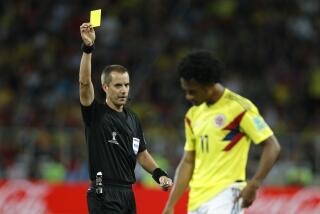Boxing makes moves to avoid controversies
- Share via
Eight years ago at the Sydney Olympics, the International Boxing Assn. had spy cameras installed over the scoring tables to keep an eye on their judges.
At the Beijing Games, they will finally get around to putting up the TV screens.
As part of a series of moves aimed at erasing the stain of scandal from Olympic boxing, oversized video monitors will be placed around the ring so that fans and the media can monitor the judging as the bouts progress. Smaller monitors will be placed in each corner so trainers can keep score as well.
“The whole process is now extremely transparent,” said Richard Baker, communications manager for the association, or AIBA. “Everybody, including the public and the press, can see the scoring as it happens.”
The monitors were used at last fall’s Cadet World Championships and again in October’s AIBA World Championships in Chicago, where Baker said they were well received.
But the screening process doesn’t stop there. The 34 judges and referees chosen to work the Olympic tournament, who underwent a rigorous qualification procedure just to be invited to China, also will have their work reviewed after each bout. That system also was tested in Chicago and some officials were relieved of their duties when their scoring was determined to be out of sync.
“The evaluation involves not only monitoring of the respective scoring of each judge, but also the conduct and competence of the referees in the ring,” said Baker, who added that officials are not informed which fight they will be working until one bout prior to their assignment.
Scoring controversies have been almost as prevalent as knockdowns in international boxing, with the low point coming in the 1988 Seoul Olympics, when Korean fighter Byun Jong-il staged a 67-minute sit-in in the ring to protest the scoring of his bout. That touched off a near-riot in which Keith Walker, the New Zealander who was the referee at the match, was physically attacked by Korean boxing officials and security guards.
Americans Roy Jones Jr. and Floyd Mayweather Jr. also lost highly questionable decisions, prompting allegations of corruption that led to the suspension of 18 judges and referees.
Four years later, computer scoring was introduced, but former AIBA president Anwar Chowdhry later acknowledged that much of the judging in Barcelona was corrupt as well.
It wasn’t until after the 2004 Athens Games that the International Olympic Committee got involved and withheld $1 million from the AIBA in an effort to force change. That set the stage for Chowdhry’s ouster two years ago with his successor, the reform-minded Ching-Kuo Wu of Taiwan, promising to make the sport transparent and respectable.
And if Chicago -- the first tournament held since the AIBA approved the new rules -- is any indication, Wu may get his wish.
“There were no protests in the whole tournament of 500-plus bouts,” Baker said. “It was a very successful tournament.”
--
More to Read
Go beyond the scoreboard
Get the latest on L.A.'s teams in the daily Sports Report newsletter.
You may occasionally receive promotional content from the Los Angeles Times.











